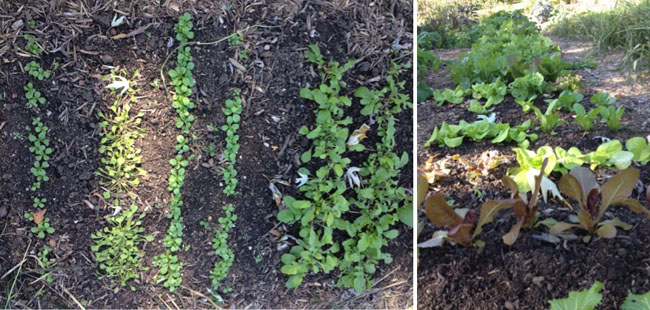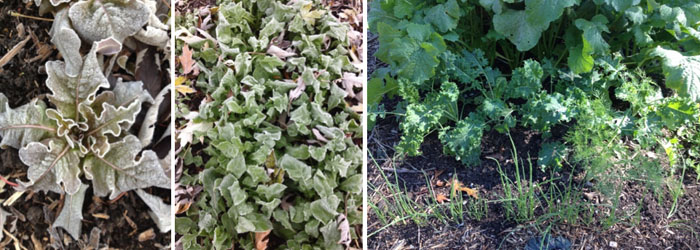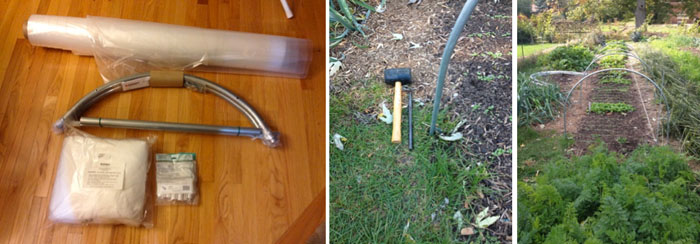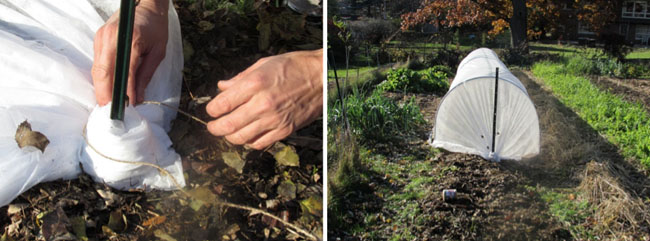"We are what we repeatedly do. Excellence, then, is not an act, but a habit." --Aristotle
Address any questions or comments regarding this newsletter to the individual authors listed after each article or to its editor, Rick Weinzierl, 217-333-6651, weinzier@illinois.edu. To receive e-mail notification of new postings of this newsletter, call or write the same number or address.
In This Issue:
A Regional Note from Southern Illinois
Vegetable Production and Pest Management (hydroponic production workshops; low-tunnel observations from McLean County)
Local Foods Issues (extended comment period on rule-making for the Food Safety Modernization Act, water quality for food safety)
Upcoming Programs
The 2014 Illinois Specialty Crops, Agritourism, and Organics Conference will be held January 8-10, 2014.
Check the Illinois SARE calendar for a full list of programs and links for registration.
http://illinoissare.org/ and http://illinoissare.org/calendar.php
Also see the University of Illinois Extension Local Food Systems and Small Farms Team's web site at:
http://web.extension.illinois.edu/smallfarm/ and their calendar of events at http://web.extension.illinois.edu/units/calendar.cfm?UnitID=629.
- 2014 Illinois Specialty Crop, Agritourism, and Organics Conference, January 8-10, 2014, Crowne Plaza Hotel and Conference Center, Springfield, IL. Lots more details to come, but it's time to mark your calendars. The keynote speaker on January 9 will be Elliot Coleman, co-author of Four-Season Harvest: How to Harvest Fresh Organic Vegetables from Your Home Garden All Year Long, and author of other widely popular books on high tunnel production and organic production. In addition to concurrent tracks on fruits, vegetables, herbs, agritourism, and organics on January 9 and 10, pre-conference workshops on January 8 will feature (1) Pumpkin Production, Pest Management, and Marketing; (2) Season Extension and Year-Round Markets; (3) GAPS and Food Safety Guidelines for Growers who Sell at Farmers' Markets; and (4) Optimizing Plasticulture and Drip Irrigation Practices (a.m.) and Growing Unique Fruits and Vegetables (p.m.). In addition, training and testing for the Private Applicator License (pesticides) will also be offered on January 8.
- Local Food Systems & Small Farms Team Winter Webinar Series, Thursdays, January 9-March 27, 2014. 1:00-2:30 p.m. Multiple topics for small farms. Sessions are presented by U of I Extension Educators and Specialists. No cost. For a list of topics and to register, see http://go.illinois.edu/winterwebinar.
- "Putting Small Acres to Work" Workshops, multiple locations, January 18-April 5, 2014. The University of Illinois Extension Local Food Systems and Small Farms Team is coordinating a series of workshops on topics that help people learn ways to put a few acres to use. Details and registration information are available at http://web.extension.illinois.edu/smallfarm/puttingsmallacrestowork.html.
- Strategies to Minimize the Potential for Herbicide Injury to Specialty Crops (workshop), January 28, 2014. 10:00 a.m. -- 1:00 p.m. Galesburg Extension Office, Galesburg, IL. No cost, lunch will be offered. For more information and to register, see https://webs.extension.uiuc.edu/registration/?RegistrationID=9232.
- Horseradish Growers Conference, January 30, 2014. Madison-Monroe-St Clair Branch Office, Collinsville, IL. Contact Patricia Stanton, 618-344-4230 or pstanton@illinois.edu, to receive registration materials.
- Illinois Grape Growers and Vintners Association Annual Conference, January 30-February 1, 2014. Crowne Plaza Hotel and Conference Center, Springfield IL. Contact: Megan Pressnall, Director of External Relations, IGGVA, 217-726-8518 or megan@illinoiswine.com. Registration coming soon at http://www.illinoiswine.org/index.html.
- Southwestern Illinois Commercial Tree Fruit School, February 4, 2014. Knights of Columbus Hall, Hardin, IL. Contact: Michelle Vogel at 618-576-2293 or mbergv@illinois.edu. Registration coming soon at http://web.extension.illinois.edu/ccgms/.
- Southern Illinois Commercial Tree Fruit School, February 5, 2014. Mt Vernon Holiday Inn, Mt. Vernon, IL. Contact: Patricia Stanton at 618-344-4230 or pstanton@illinois.edu. Registration coming soon at http://web.extension.illinois.edu/mms/.
- Fresh Market Pepper Production Webinar, February 10, 2014. 6:00-7:30 p.m. Topics include: types/varieties, production practices, IPM, harvest/post-harvest handling, and marketing. Register at https://webs.extension.uiuc.edu/registration/?RegistrationID=9352 .
- Illinois Small Fruit & Strawberry School and Southern Illinois Commercial Vegetable School, February 11-12, 2014. Mt Vernon Holiday Inn, Mt. Vernon, IL. Contact: Patricia Stanton at 618-344-4230 or pstanton@illinois.edu. Registration coming soon at http://web.extension.illinois.edu/mms/.
- eOrganic webinar on organic management strategies for spotted wing Drosophila, February 11, 2014. 1:00 p.m. Central Time. No charge; advance registration is required. Attendees will be able to type in questions for the presenters. Register at: https://www1.gotomeeting.com/register/720633376
- Hydroponic Production Workshop, Urbana, IL, February 18-19, 2014. University of Illinois Campus, Urbana, IL. This 2-day workshop will cover basic hydroponic principles and practices and will include both classroom and hands-on lab activities.. The cost for the 2-day program is $95 per person, and one guest per registrant can attend for an additional $45. For more information or to register please email jkindhar@illinois.edu or call 618/695-2770. See the agenda for this workshop below.
- 11th Annual Central Illinois Composting Symposium, "What's the Dirt on Composting," February 19, 2014. 9:00 a.m. - 3:00 p.m. $30.00 registration fee. For more information and to register, contact Deborah Cavanaugh-Grant at 217-782-4617 or cvnghgrn@illinois.edu; see at http://web.extension.illinois.edu/lms
- Hydroponic Production Workshop, St. Charles, IL, February 25-26, 2014. St. Charles, IL (University of Illinois Kane County Extension Office and the St. Charles Horticulture Research Center). This 2-day workshop will cover basic hydroponic principles and practices and will include both classroom and hands-on lab activities.. The cost for the 2-day program is $95 per person, and one guest per registrant can attend for an additional $45. For more information or to register please email Shelby Henning at sheening@illinois.edu or call 630-584-7254. See the agenda for this workshop under the Vegetable Production heading below.
- MOSES Organic Farming Conference, February 27-March 1, 2014. La Crosse Center, La Crosse, WI. For more information and to register, see http://mosesorganic.org/conference/ .
A Regional Note from Southern Illinois
In southern Illinois ... just like everywhere else, it's cold. It took about 2 weeks to thaw the nearly 10 inches of snow we received in early December. We received about ½ inch of snow on January 1, and there are some predictions for more snow into the weekend and next week. Even given a few "warm" days, the soil is still frozen and will likely be frozen even harder with low temperatures predicted to dip below zero the first of next week. Given these temperatures, a little snow would be beneficial to help insulate the soil and prevent injury to cover crops and some perennial crops. Some local orchards have started pruning apples. Given the cold and cloudy days, winter crops in high tunnels have had limited growth and production. Fortunately the winter thus far has been fairly consistently cold, so most perennial crops are fully dormant and acclimated to the cold as best they can be.
Nathan Johanning (618-939-3434; njohann@illinois.edu)
Vegetable Production and Pest Management
Hydroponic Production Workshops
The University of Illinois will host two 2-day workshops on hydroponic production. The workshops will provide information to anyone interested in hydroponic small fruit or vegetable production. The number of producers using hydroponic production systems in Illinois is increasing, and there are many people who have indicated a desire to learn more about hydroponic production for both recreational and commercial growing. These workshops will offer the opportunity to get a strong foundation in basic hydroponic principles and practices and will include both classroom and hands-on lab activities.. The cost for the 2-day workshops is $95 per person, and one guest per registrant will be allowed for an additional $45. The workshop at Urbana will be held on February 18-19, 2014, and the workshop at St. Charles will be held on February 25 and 26, 2014. For more information or to register, please email jkindhar@illinois.edu or call 618/695-2770 for the Urbana workshop or contact Shelby Henning at shenning@illinois.edu for the St. Charles workshop. The tentative program for these workshops is ...
Day 1 | |
|---|---|
9:00 | Overview of Hydroponic Production Systems |
10:30 | Basics of Greenhouse and High Tunnel Growing |
12:00 | Lunch |
1:30 | Greenhouse tour |
2:30 | Plant Nutrition Basics |
3:30 | Leafy Greens, Cucumber, and Strawberry Hydroponic Production Basics |
5:00 | Adjourn |
Day 2 | |
9:00 | Basics of Starting a Horticulture Business |
10:30 | Water Testing, Fertilizers and Feeding |
12:00 | Lunch |
1:00 | Greenhouse Integrated Pest Management |
2:15 | Tomato Production Basics |
3:15 | Greenhouse Tour -- Hydroponic Systems Demonstrations |
5:00 | Adjourn |
Low Tunnels for Season Extension
A lot of research has been done on season extension for market farmers, but there is little data available from central Illinois farms. Low tunnels offer a very flexible, low cost way to provide a protected growing environment to crops. These structures can extend the fall and winter harvest season for greens and with the right succession planting schedule offer earlier harvests in the spring. There is potential to direct-seed a crop like Walla Walla onions in late summer and protect them through the winter allowing a harvest of full-size bulbs 4 to5 weeks earlier than spring-planted onions. It may also be possible to direct-seed in the winter and cover the soil with a low tunnel to get plants such as carrots, onions, peas, etc. to germinate very early in the spring and get a jump on the season.
I am using a low tunnel to observe the cold-hardiness and eating quality of a variety of cold-hardy crops over the winter of 2013-2014. I planted a mix of cold-hardy crops starting on August 23 and ending on September 28. Some varieties are newly-created farmer bred varieties that have been selected for cold-hardiness and have the ability to survive lower winter temperatures than the standard varieties offered by most seed companies. I covered the crops with a low tunnel to test winter hardiness and eating quality of a range of vegetables over the winter. The goal is to collect data for central Illinois on planting dates, winter survival, eating quality, and the performance of different crops and varieties.
I purchased a "quickhoops" bender from Johnny's Seeds and built a low tunnel using ½-inch EMT conduit. I covered the tunnel with Agribon 19 fabric on November 9.. I added a layer of greenhouse poly on November 23. I crossed a rope over the tunnel by threading it through a 9-gauge wire staple at the base of every other hoop on alternating sides. I also put bricks and bags of rocks on the plastic. The biggest challenge so far has been keeping the plastic on the hoops. If you live in a windy area be sure to use a lot of heavy objects to hold the plastic down.
Other farmers have found that low tunnels tend to average 5 degrees of protection to crops under moderate conditions and the amount of protection increases when temperatures drop to extreme lows. I have observed similar results in my low tunnel. On November 10 and 11the nighttime low temperature was 18 degrees and the low temperature inside the tunnel was 27 degrees. When the sun shines the temperature inside the tunnel rises into the 60's during the day when outside temperatures are in the 30's.
Through early December the combination of warmer temperatures and low winds resulted in continued growth and high quality greens. On November 26th the outside temperature dropped to 11 degrees and the temperature inside the tunnel was 21 degrees. The low of 21degrees did slight damage to some of the outer leaves of the greens, but most greens were still thriving in early December and the inner leaves were still edible and could be sold to winter CSA customers or other winter marketing outlets.
I will provide an update on the effects of the snows and colder weather during recent weeks later this month and monitor and report on the condition of these crops through March. See the details and some photos below.
Planting dates for low tunnel crops. | |
|---|---|
August 23 |
Evergreen Hardy White Onion, Vates Kale, Aprovecho hardy Turnip (Adaptive Seeds), Arugula, Tres Fine Endive, Keystone Endive, Manoa Lettuce (Wild Garden Seed), Brown Goldring Lettuce (Wild Garden Seeds) |
August 26 |
Cornet De Bordeaux Escarole (Adaptive Seeds), Pokey Joe Cilantro (Adaptive Seeds) |
September 6 |
Arugula, Pokey Joe Cilantro, Cornet De Bordeaux Escarole, Brown Goldring Lettuce, Manoa Lettuce (Adaptive Seeds), Briweri Lettuce (Adaptive Seeds) |
September 13 |
Winter Density Lettuce, Winter Marvel Lettuce, Brown Goldring Lettuce, North Pole Lettuce, Rouge D'hiver Lettuce, Chinese Thick Stem Mustard (Even Star Farms), Even Star Tatsoi (Even Star Farms), Even Star Winter Arugula (Even Star Farms), Vit Mache, Claytonia |
September 18 |
Vit Mache, Claytonia, Even Star Winter Arugula (Even Star Farms) |
September 18 |
Vit Mache |
Seed Sources. Johnny's Seeds, Fedco Seeds, Wild Garden Seeds, Adaptive Seeds. | |

Greens in early November before being covered with low tunnel.

Left and center. head lettuce and ice bred arugula in the morning after a low of 27F. Right. Evergreen hardy white onions, Vates kale, hardy turnips.

Left. Low tunnel supplies from Johnny's. Center and right. I used a hammer and punch to create a hole and pushed the conduit in about 12 inches deep. A string tied to each end helps keep the hoops in line.

I installed the rowcover by tying it to posts at either end of the bed.

From left (1) greens inside low tunnel on November 26; (2) Keystone Endive, note slight drooping over outer leaves due to cold damage; (3) Rouge D'hiver Romaine lettuce on December 1 was the first variety to show significant damage from the cold temperatures; (4) Bibb lettuce inside the low tunnel on December 2.
Bill Davison (309-663-8306; wdavison@illinois.edu)
Local Foods Issues
Food Safety Modernization Act (FSMA) - Next Steps: Second Round of Public Comment
Based on the thousands of public comments received regarding the Food Safety Modernization Act, the Food and Drug Administration (FDA) announced that it will propose revised rule language and open another comment period on two of the proposed rules affecting farmers, both small and large. The four issues needing major reform include (1) water quality standards and testing, (2) standards for using raw manure and compost, (3) provisions affecting mixed-use facilities (farms that engage in value-added agriculture), and (4) process considerations for farms who are eligible for qualified exemptions from FSMA requirements.
An FDA press release stated that "we have heard the concern that these provisions, as proposed, would not fully achieve our goal of implementing the law in a way that improves public health protections while minimizing undue burden on farmers and other food producers.". Based on these comments, the FDA will propose new rule language and again ask for public comment. There may be other revisions to the proposed rules; the scope of the revised proposals, on which they will seek further comment, will be determined after they complete their initial review of written comments. Plans are to publish the revised proposed rule by early summer 2014.
According to Ferd Hoefner, National Sustainable Agriculture Coalition's Policy Director, "it is important for major rulemakings to include careful economic and environmental analysis of the likely outcomes of implementation. Farmers need to know that food safety rules are not going to put them out of business. Also, for a final rule to be truly effective, more discussion is needed on the details of how the federal-state interface will work to ensure effective implementation and prevent unfunded mandates."
For more information, check out these two websites for the Food and Drug Administration (http://www.fda.gov/Food/GuidanceRegulation/FSMA/default.htm. and the National Sustainable Agriculture Coalition (http://sustainableagriculture.net/fsma/). There was also an excellent article on this topic in the latest issue of the Vegetable Grower News at http://vegetablegrowersnews.com/index.php/news/release/29895
Deborah Cavanaugh-Grant (217-782-4617; cvnghgrn@illinois.edu)
Food Safety: Water Use on the Farm
Related to food safety, water quality is a topic that is little understood for Good Agricultural Practices (GAPs). Questions from growers and processors range from use of creek water and pond water for irrigation to recommendations for sanitizing wash water. Water is one of the most critical components of food safety on the farm and in post-harvest handling of produce. Water has the capability to carry microbes, chemicals and physical pollutants. It is used in every aspect of the farm operation -- planting, irrigation, frost protection, processing, cooling operations, produce wash and rinsing, facility cleanup, worker hygiene, and pesticide application. At any one of these points, contaminated water could introduce pathogens onto produce which could potentially reach consumers.
Water quality requirements are dependent on how water is used and the intended purpose. If water is coming in contact with the edible portion of produce, such as on leafy greens, on carrot roots or on strawberry fruit, it is labeled as "agricultural water.". The proposed FSMA rule requires that "all water intended or likely to come in contact with either the harvestable portion of covered produce or a food-contact surface be of safe and sanitary quality for its intended use.". By this definition, irrigation water that is applied through drip tape on a tomato crop is not agricultural water. However, if cantaloupes need to be washed, potable water should be used, even though we do not consume the fruit rind, because the contaminated rind could potentially introduce pathogenic microbes into the flesh of the fruit.
The quality of water should be tested in a laboratory. Departments of Public Health at the county level do accept water samples for coliform counts. A coliform count is a test of water contamination in which the resulting number of the colonies of coliform bacteria (Escherichia coli per 100 milliliter of water) is counted. It mainly tests for the presence of harmless indicator organisms that might indicate the presence of pathogenic organisms. Basic water quality tests also estimate the nitrate content.
Before you submit water samples for testing, call your local Public Health office for proper water sample collection instructions and other vital information, including cost and turnaround time. Other tests for toxic metals and/or chemicals can be done, but they cost much more than the basic coliform/nitrate test.
To disinfect water, there are several sanitizers to choose from. The most common one is industrial sodium hypochlorite, whose active ingredient is chlorine (it is similar to household bleach, which is not recommended for use in GAPs). Chlorine and other types of molecules are considered oxidizing agents, and they therefore easily damage and destroy microbial cells. Approved sanitizers for organic growers are listed here: http://www.extension.org/pages/18355/approved-chemicals-for-use-in-organic-postharvest-systems.
James Theuri (815-933-8337; jtheu50@illinois.edu)
Less Seriously ...
- A few days after New Year's is when most people find out that it's easier to break a resolution than a habit.
But ...
- Don't worry too much if you've broken your New Year's resolution ... you can always make it next year.
University of Illinois Extension Specialists in Fruit and Vegetable Production & Pest Management
Extension Educators – Local Food Systems and Small Farms |
||
Bronwyn Aly, Gallatin, Hamilton, Hardin, Pope, Saline, and White counties |
618-382-2662 |
|
Katie Bell, Franklin, Jackson, Perry, Randolph, & Williamson counties |
618-687-1727 |
|
Sarah Farley, Lake & McHenry counties |
847-223-8627 |
|
Nick Frillman, Woodford, Livingston, & McLean counties |
309-663-8306 |
|
Laurie George, Bond, Clinton, Jefferson, Marion, & Washington counties |
618-548-1446 |
|
Zachary Grant, Cook County | 708-679-6889 | |
Doug Gucker, DeWitt, Macon, and Piatt counties |
217-877-6042 |
|
Erin Harper, Champaign, Ford, Iroquois, and Vermillion counties |
217-333-7672 |
|
Grace Margherio, Jackie Joyner-Kersee Center, St. Clair County |
217-244-3547 |
|
Grant McCarty, Jo Daviess, Stephenson, and Winnebago counties |
815-235-4125 |
|
Katie Parker, Adams, Brown, Hancock, Pike and Schuyler counties |
217-223-8380 |
|
Kathryn Pereira, Cook County |
773-233-2900 |
|
James Theuri, Grundy, Kankakee, and Will counties |
815-933-8337 |
|
Extension Educators – Horticulture |
||
Chris Enroth, Henderson, Knox, McDonough, and Warren counties |
309-837-3939 |
|
Richard Hentschel, DuPage, Kane, and Kendall counties |
630-584-6166 |
|
Andrew Holsinger, Christian, Jersey, Macoupin, & Montgomery counties |
217-532-3941 |
|
Extension Educators - Commercial Agriculture |
||
Elizabeth Wahle, Fruit & Vegetable Production |
618-344-4230 |
|
Nathan Johanning, Madison, Monroe & St. Clair counties |
618-939-3434 |
|
Campus-based Extension Specialists |
||
Kacie Athey, Entomology |
217-244-9916 |
|
Mohammad Babadoost, Plant Pathology |
217-333-1523 |
|